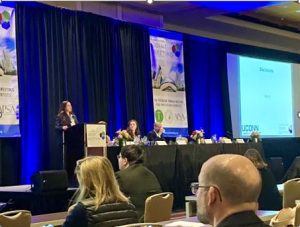A recent study lead by Pearl Sutter, a graduate student in the lab of Dr. Stephen Crocker, which appeared in the prestigious Journal of Experimental Medicine (IF 17.579) on Sept 4, 2023 has received notice that it will also appear in a select issue of that journal to be released at the upcoming Society for Neuroscience meeting in Washington D.C.! The study is the first to define an important role for CD8+ T cells in a genetic disease called globoid cell leukodystrophy (aka Krabbe disease).
Pearl is a sixth year MD/PhD dual degree student who has been studying the immunological underpinnings of a rare and incurable neurological disease called Globoid cell leukodystrophy. Her recently awarded F30 fellowship project entitled “The role of microglia as antigen presenting cells in Globoid Cell Leukodystrophy” is supported by the National Institute of Neurological Disorders and Stroke (NINDS).
An abstract on this work was also selected for a rare honor of a platform presentation at the joint meeting of the AAP/ASCI/APSA this past April in Chicago, IL. Hers was the only abstract selected for the APSA Trainee Oral Abstract Presentation this year. Director of the MD/PhD dual degree program, Dr. Kim Dodge-Kafka, commented on this accolade:
“We are very proud of this outstanding accomplishment by Pearl and that she will be representing our MD/PhD program. She is our first MD/PhD student in recent memory that has earned this honor at the AAP/ASCI/APSA Annual Meeting. This conference has been very important to our program as many of our students have been annually attending for quite a long time, and much of this has been possible due to Dr. Andy Arnold who has provided the majority of the funds for our students to attend as an instrumental piece of our Physician-Scientist Career Development.”
Lastly, the Crocker lab also received private foundation funding as a 3 year extramural grant from the Rosenau Family Research Foundation (formerly The Legacy of Angels Foundation), a family who unexpectedly experienced Krabbe disease and have made it their mission to support research to uncover new treatments for this devastating disease.
